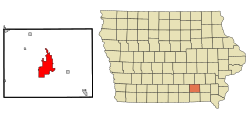Ottumwa
| Ottumwa, Iowa | |
|---|---|
| City | |
 Location of Ottumwa in the state of Iowa. |
|
| Coordinates: 41°0′47″N 92°24′53″W / 41.01306°N 92.41472°WCoordinates: 41°0′47″N 92°24′53″W / 41.01306°N 92.41472°W | |
| Country |
|
| State |
|
| County | Wapello |
| Government | |
| • Type | Mayor/Council |
| • Mayor | Tom Lazio |
| Area | |
| • Total | 16.53 sq mi (42.81 km2) |
| • Land | 15.86 sq mi (41.08 km2) |
| • Water | 0.67 sq mi (1.74 km2) |
| Elevation | 673 ft (205 m) |
| Population (2010) | |
| • Total | 25,023 |
| • Estimate (2013) | 24,840 |
| • Rank | 20th in Iowa |
| • Density | 1,577.7/sq mi (609.2/km2) |
| Time zone | CST (UTC-6) |
| • Summer (DST) | CDT (UTC-5) |
| ZIP code | 52501 |
| Area code(s) | 641 |
| FIPS code | 19-60465 |
| GNIS feature ID | 0459952 |
| Website | http://www.cityofottumwa.org/ |
Ottumwa (/əˈtʌmwə/ ə-TUM-wə) is a city in and the county seat of Wapello County, Iowa, United States. The population was 25,023 at the 2010 census. Located in southeastern Iowa, the city is split into northern and southern halves by the Des Moines River.
The young town was severely damaged during the Flood of 1851.
In 1857, coal was being mined from the McCready bank, a site along Bear Creek four miles west of Ottumwa. In 1868, Brown and Godfrey opened a drift mine four miles northwest of town. By 1872, Brown and Godfrey employed 300 men and had an annual production of 77,000 tons. In 1880, the Phillips Coal and Mining Company opened a mine two miles northwest of town. In subsequent years, they opened 5 more shafts in the Phillips and Rutledge neighborhoods, just north of Ottumwa. The Phillips number 5 shaft was 140 feet deep, with a 375 horse power steam hoist. By 1889, the state mine inspector’s report listed 15 mine shafts in Ottumwa. In 1914, the Phillips Fuel Company produced over 100,000 tons of coal, ranking among the top 24 coal producers in the state.
Coal mining was so important to the local economy that, from 1890 to 1892, the Coal Palace was erected in Ottumwa as an exhibition center.
John Morrell & Company played a significant role in the development of the City of Ottumwa from 1877 to 1973. The complex typified meat packing as it developed in the midwest during the last quarter of the nineteenth century and the first half of the twentieth century.
...
Wikipedia
